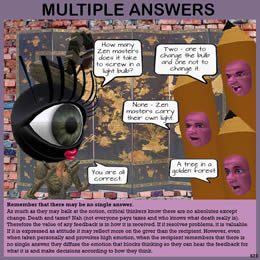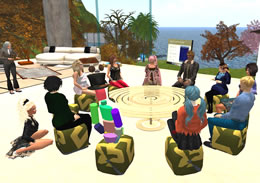HOMEDramafied Thinking Models Critical Thinking
Creative Thinking
Strategic Thinking
Symbolic Thinking Visual Learning Comics & Graphics
Videos & Film
Narrative Learning
Virtual LearningActive Learning Classrooms
Online & MOOC's
Virtual ImmersionInteractive Learning Mind Games
Games of Play
Writing Exercises
Self-Assessment Collaborative Learning
Peer Feedback
ESL Writing GroupsEdtech Industry Equity Partners
Procurement Into the FutureAbout the AuthorContact
- Collaborative Learning
- Peer Feedback
- ESL Writing Groups
The benefits of collaborative learning include:
Cornell University Center for Teaching Excellence In the digital world, collaborative learning can come in many forms. These interactions serve as a microcosm of what learners can expect in the workplace. Learning to work with diverse populations is integral to future success. Training of Thought includes collaborative learning opportunities for the classroom or online. Alternative strategies are offered to independent learners. |
Learners discover how to separate the personal from the intellectual through writing dialogues of constructive debate.
|
When learners give one another feedback on their thinking and writing they are forced to see their work through the eyes of another. Training of Thought helps learners understand the process of giving feedback as well as hearing feedback that isn't particularly constructive. Peer feedback is also a way of learning empathy, a key to enhancing all types of thinking skills. As learners proceed through the modules, they will be more comfortable sharing their work and the thinking and writing exercises will become more challenging. Peer feedback can be conducted in the classroom, by phone, with conferenciing software. in a virtual world or by another process of communication. |
Feedback of any kind can help learners improve their thinking skills and written work.
|
English is not the first language of many learners and they may need special support when it comes to writing. These learners have a steeper learning curve. However, all learners can benefit from participating in a writing group. Training of Thought offers guidelines for writing groups that occur in the classroom or online so that learners can effectively support one another in their writing efforts. The guidelines focus less on grammar and editing, and more on the planning and structuring of a written work so it meets the requirements of the assignment. Writing groups are a fast-track method of learning how to give and receive feedback. Because of the dynamics of group process and the personal nature of writing, high emotions can arise and force learners to think in new ways. However, they can also help learners improve their thinking and writing at a faster pace. Training of Thought celebrates the use of writing groups as a way of supporting its use in instruction. |
Writing groups can help both native and nonnative speakers of English enhance their thinking and writiing skills.
|

Visual Learning
Active Learning
Interactive Learning
Collaborative Learning
Edtech Industry
Into the Future
About the Author
Contact
